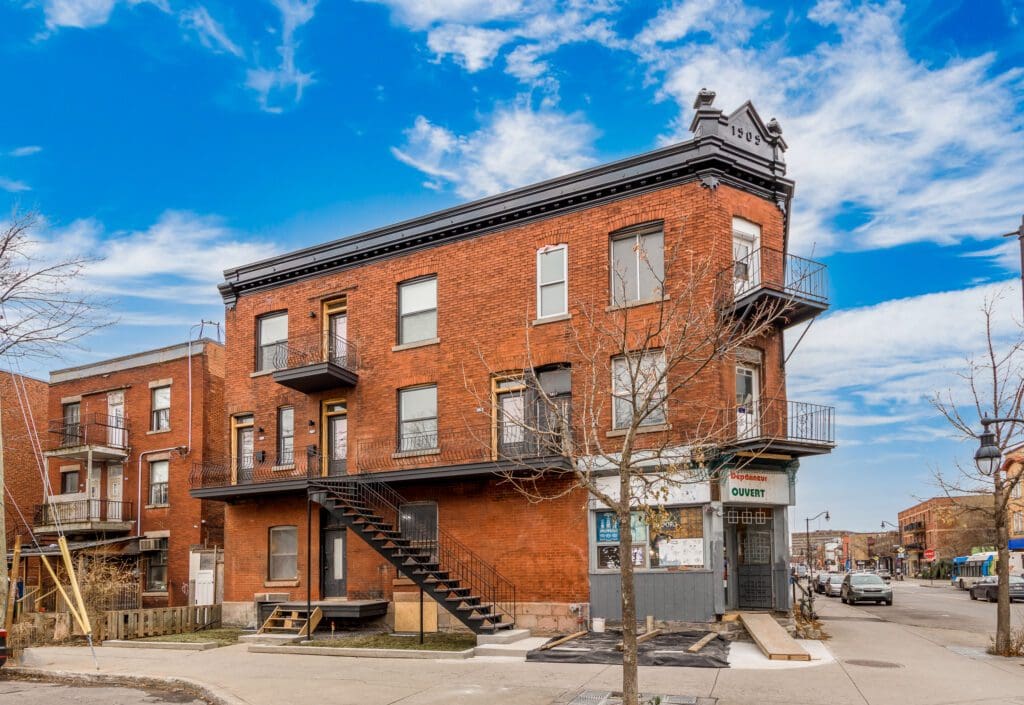
St-Jean-Baptiste: What’s open or closed on June 24?
As Quebec’s national holiday approaches, are you wondering what to do in the metropolis? Our team of real estate brokers in Montreal has put together
Courtier Immobilier Montréal Yanick E Sarrazin
Residence 5175 Chambord is an architectural project where the recently reconstructed house has preserved its original structure while enhancing the floor height, providing a completely redesigned living space. This project emerged from a deep inspiration to breathe life into a facade while scrupulously adhering to the historical criteria of the house. Materials and colors were carefully chosen to harmonize with the surrounding environment.
The goal was to create a cohesive aesthetic while injecting contemporary elements. The terracotta red color, representative of the facade, was meticulously integrated into the interior, particularly in key elements such as the staircase or windows, bringing a warm visual continuity.
At the heart of the apartment is the staircase, transformed into a centerpiece with perforated steel railings combined with white oak furniture. In the living room, the use of fluted glass creates subtle privacy between rooms. This combination produces a light effect, allowing the infiltration of natural light.
In the bathroom, ochre-yellow ceramic, a warm hue, contrasts with gray tiles, creating a vibrant ambiance. The ochre color theme continues with a backsplash in the kitchen, providing visual coherence throughout the house, evoking a welcoming atmosphere.
The design extends outdoors with a private rooftop terrace equipped with planting boxes, inviting nature to merge with the living space. The kitchen, located on the second floor, shares the floor with the rooftop terrace, offering a direct connection between the culinary space and the outdoor area.
Residence 5175 Chambord has been meticulously designed to blend the old and the new, creating a refined living space where history intertwines with innovation, forming a welcoming and aesthetically pleasing environment

_naturehumaine is an architecture and design firm based in Montreal. The agency holds the vision that architecture is at the center of our lives and serves as a medium regulating our interactions with the world. The architecture firm undertakes a variety of projects with the goal of designing dynamic and inspiring living spaces. These spaces aim to positively contribute to the development of individuals and communities.
From private residences and multi-unit housing to shops and museums, the projects are diverse. Indeed, _naturehumaine makes each project unique and showcases it to its full potential. Innovative and unconventional projects? _naturehumaine enjoys breaking away from the beaten path. The agency has, in fact, received numerous awards for the quality and originality of the projects undertaken.
In a space designed by _naturehumaine, high-quality materials have been used. Aluminum windows provide durability and aesthetics, a perforated steel staircase is both elegant and functional, and a heated oak plank floor brings warmth and refinement, highlighting the perfect blend of contemporary aesthetics and timeless functionality
Living in Petit Laurier means residing in a peaceful atmosphere within an urban setting.
Groceries, restaurants, cafes, and charming shops—Petit Laurier, a unique neighborhood, provides its residents with the benefits of the city through the abundance and proximity of its businesses and major arteries, all in a welcoming and friendly atmosphere. Both youthful and family-oriented, this distinctive neighborhood creates a warm, convivial, and vibrant living space.
Numerous services and shops within walking distance.
Many services and shops within walking distance.
A wide range of products and services are available in Petit Laurier.
Here’s a glimpse of two favorite addresses to discover in the area: Stella Pizzeria and Nikkei MTL.
At the corner of Rue de Lanaudière and Laurier Avenue E is Stella Pizzeria. This neighborhood pizzeria offers Italian dishes crafted by Chef Alessandro. His cuisine showcases the delights of Puglia, his hometown in Italy, through dishes that highlight traditional flavors reimagined with creativity.
Stella Pizzeria‘s reputation is built on the excellence of its pizza, with a crispy, light, and flavorful crust resulting from unparalleled craftsmanship. Each ingredient is carefully selected to top these pizzas. Among the must-try dishes are also homemade ravioli and Eggplant Parmigiana. In terms of beverages, the carefully crafted cocktail menu and wine selection perfectly complement this Italian feast.
This place, where traditional recipes blend with contemporary creativity, is a must-visit for any lover of exquisite Italian cuisine, where passion and authenticity come together seamlessly.
Opened in 2022, Nikkei restaurant offers a refined and captivating culinary experience. The Nikkei restaurant menu showcases a variety of dishes that seamlessly blend Japanese and Peruvian influences. From sushi to tiraditos, sashimi to ceviches, each dish is prepared with meticulous attention to detail and flavor balance.
The cocktails at Nikkei often blend traditional ingredients from both cultures, creating unique and refreshing beverages. The subtle flavors and artistic presentations of the cocktails perfectly complement the meal.
Whether for a special occasion, a dinner with friends, or an intimate meal, Nikkei restaurant provides a memorable culinary experience that combines tradition and innovation, inviting guests to explore a unique fusion of flavors and culture.
Are you a real estate broker looking for a dynamic and high-performing organization? Contact us!
Do you have experience in administrative support within the real estate field? Would you like to be a cornerstone of an organization of brokers working for the most high-performing real estate agency in the sector?
Do you have experience in digital marketing? Would you like to be a cornerstone of an organization of brokers working for the most high-performing real estate agency in the sector?
Le Club – Café cycliste is a unique place that brings together two passions: cycling and coffee. It serves as a meeting point for cyclists, biking enthusiasts, and locals who share a common love for bicycles. The establishment offers a welcoming space where cyclists can gather, discuss their latest biking adventures, and plan future outings.
The café exudes a warm and inviting atmosphere with décor centered around cycling. The walls are adorned with bicycles, accessories, and photographs associated with the world of biking. It’s an ideal spot to stop by after a bike ride in the neighborhood or to relax with a great cup of coffee.
Regarding food and beverages, Le Club – Café cycliste offers a selection of quality coffees, fresh pastries, sandwiches, and snacks. It’s the perfect place to recharge after a bike ride or simply savor a coffee break. Located close to our office, it’s actually the favorite spot of Kemsley, assistant to real estate brokers. His go-to choices? A matcha latte paired with a pear grilled cheese.
Recently opened next to the café, the Le Club Boutique offers a variety of high-quality clothing, helmets, and accessories for cyclists. It is renowned for its expertise in bike mechanics, providing top-notch repair and maintenance services. The shop also offers city bikes, road bikes, spare parts, and much more.
This café also serves as a starting point or a stop for organized bike rides, cycling events, and workshops on bike mechanics. It provides support to cyclists, whether they are beginners or experienced, and fosters a real sense of community around the passion for cycling.
Follow in Kemsley’s footsteps and our real estate brokers and visit them at 3801 St. Denis Street, in the Plateau-Mont-Royal.

As Quebec’s national holiday approaches, are you wondering what to do in the metropolis? Our team of real estate brokers in Montreal has put together

Montreal, May 24, 2025 – Last week, the Michelin Guide unveiled its long-awaited list of the best restaurants in Quebec. Our team of real estate

Matcha has been all the rage in recent years. Indeed, more and more people are switching from their morning coffee to this green beverage with
675 000$
799 000$
849 000$
4 175 000$
1 199 000$
625 000$
299 000$
1 199 000$
Inspection is an essential component of the real estate buying or selling process. Conducted by a qualified professional, it represents a thorough examination of the property, its systems, and its components. This critical step enables buyers to make informed decisions by assessing the overall condition of the property, identifying potential hidden issues or defects, and estimating potential repair or renovation costs.
In the purchase agreement, there may be an inspection clause, conditioning the purchase on such an evaluation. Therefore, the buyer must have the property inspected by a home inspector before finalizing the purchase. This professional’s mission is to describe and evaluate the physical condition of the building, thus revealing any concerning elements or major issues not mentioned in the seller’s disclosure form, and providing this information in a written report. Pre-purchase inspection thus protects the buyer before completing the real estate transaction.
As part of the buying process, the collaborating broker accompanying the buyer should recommend a comprehensive pre-purchase inspection by a professional. The choice of the home inspector is of great importance in the real estate purchase. Here are some steps to follow when selecting a home inspector after submitting an offer on a property.

In Quebec, there is no professional order for pre-purchase inspectors. However, there are home inspector associations that have developed practice guidelines to guide inspectors in their profession. Additionally, an inspector may be a member of a professional order such as the Order of Certified Appraisers of Quebec, the Order of Professional Technologists of Quebec, or the Order of Architects of Quebec. These various orders aim to protect the client and ensure that their members have professional liability insurance.
Professional liability insurance, commonly known as errors and omissions insurance, protects the professional from the costs associated with losses suffered by the client in case of errors or incorrect advice. Ensure that the home inspector is properly insured in case of issues or professional errors during the inspection. Obtain written proof to verify this. This can protect you in case of disputes.
To find a suitable home inspector, ask your real estate agent for recommendations. They will be able to provide you with a list of quality inspectors, and you will have the freedom to make your own choice. You can also ask your acquaintances for references. Personal recommendations are often valuable.
Online reviews provide an authentic insight into the past customers’ experiences with a home inspector. This helps you get an idea of the quality of service offered and the inspector’s reliability. Feel free to read Google and Yelp reviews to learn more about the services offered by potential inspectors.
While the cost of the inspection should not be the sole determining factor, it’s important to compare rates from different home inspectors to ensure you find a professional who offers good value for money. It’s worth noting that your real estate broker cannot pay the home inspector’s fees as it could lead to conflicts of interest. You will need to cover this cost. A competent inspector will charge for travel, the inspection itself, and the production of the report. On average, in the Montreal region, inspectors charge $700 for divided and undivided condominiums. This cost increases to $900 for single-family homes. Some inspectors may charge a lower amount but prioritize quantity over the quality of the inspection, so be cautious.
It is important to be prepared and have a list of questions to ask the inspector. Typical questions would include: What is your training? How many years have you been practicing in this field? Are you a member of a professional association or inspector’s association? On average, how many inspections do you conduct per week? Are you an expert in a specific area/neighborhood of Montreal? Are you specialized in a specific type of property (e.g., condominium, house, multiplex, etc.)? What is the turnaround time between the inspection and the production of the report?
After an inspection, a quality home inspector will provide an inspection report that should be clear and explain the potential consequences for each issue. Before selecting your inspector, ask potential inspectors questions about the elements that will be included in the inspection report to better understand how it will be detailed.
Choose a home inspector with whom you feel comfortable and in whom you have confidence to conduct a thorough and impartial inspection.
Choose a home inspector with whom you feel comfortable and in whom you have confidence to conduct a thorough and impartial inspection.
As mentioned, the inspection is a crucial step to ensure that you are investing in a property in good condition and free from hidden defects. Once you have taken all these factors into account, you should be able to select a competent home inspector to examine the property you are considering purchasing. Additionally, don’t hesitate to contact your real estate broker, who will provide valuable advice for making an appropriate choice of a home inspector.
Encountered issues during the inspection? Check out our article : Is it possible to withdraw from an offer to purchase following an inspection?

In Montreal – whether in the Plateau Mont-Royal, Rosemont La Petite-Patrie or Villeray areas – you’ll find a large number of properties available in divided

If you’re looking for your new home, chances are you’ve already noticed the Repossession search criterion on Centris, which allows you to filter the properties

Some buyers wonder whether it’s possible to move into their new property before going to the notary? It is possible to do so, but this

The Promise to Purchase for an undivided co-ownership The Promise to Purchase an undivided property in Quebec differs significantly from that of a divided condominium.

Tranquilli-T – Key Points The Tranquilli-T Program by RE/MAX We understand that buying or selling real estate is a significant step in your life. Our

Converting a plex into a single-family house – Neighborhoods in Montreal A unique real estate project One of the real estate assets that particularly catches
It is a space where individuals and families live and reside. Residential real estate pertains to properties used for housing purposes. Single-family homes, apartments, condos, and apartment buildings with four units or fewer are considered residential buildings.

Owners of residential real estate can be individuals, real estate investors, or companies specializing in the residential sector. For the purpose of renting the property, the landlord must fill out the mandatory lease from the Tribunal administratif du logement. In residential real estate, the lease is typically of shorter duration, usually ranging from six to 12 months. When acquiring a used residential real estate property (not considered new), the transaction is exempt from GST (Goods and Services Tax) and QST (Quebec Sales Tax).

It is a space designed to house commercial, industrial, office, or retail activities. Commercial real estate pertains to properties used for commercial or professional purposes. A building is considered commercial when it has five or more residential units. A mixed-use building is also considered commercial. It features a structure where the lower levels are intended for businesses or offices, while the upper floors can be configured as apartments or residential units. Offices, shopping malls, warehouses, hotels, restaurants, and industrial complexes are examples of commercial buildings.
Owners of commercial real estate can be institutional investors, businesses, real estate developers, or individuals. When purchasing a commercial property, GST (Goods and Services Tax) and QST (Quebec Sales Tax) apply to the portion representing the percentage used for commercial purposes. Commercial real estate is often leased to businesses or commercial tenants, which can generate higher income compared to residential real estate.
Commercial leases typically have longer terms and specific conditions. Some leases can have a duration of five to ten years. Moreover, in the commercial sector, it is not mandatory to use leases from the Tribunal administratif du logement, as is the case in residential real estate.
Different rules apply to commercial leases. For instance, the owner of a commercial property can request a security deposit from the tenant, which is not allowed in residential leases. They can also prohibit subleasing or the termination of the lease by the tenant. At the end of the lease, the tenant must vacate the commercial space, whereas in residential real estate, the lease is automatically renewed. Additionally, in case of a dispute, the owner and the tenant must go to the Superior Court or the Court of Quebec, rather than the Tribunal administratif du logement as is the case in residential real estate.
Different terms are used to refer to what landlords and tenants must pay in a commercial lease:
-Gross lease: This is a lease where everything is included. The tenant only has to pay their rent. Costs related to the property are included in the rent or paid by the landlord. Charges included in a gross lease may encompass utilities (such as water, electricity, and heating), maintenance of common areas, property taxes, basic insurance costs, and similar expenses. However, it’s important to note that how these charges are apportioned between the tenant and the landlord can vary from one gross lease to another.
-Triple Net Lease (Net, Net, Net): In a triple net lease, the tenant is responsible for paying, in addition to their base rent, the expenses related to the property (cleaning, electricity, municipal or school taxes, etc.). In a triple net lease, the tenant assumes the responsibility of paying not only the base rent but also all operating expenses of the property, including property taxes, insurance premiums, and maintenance costs.
The main distinctions between residential and commercial real estate lie in the use of the properties. Residential buildings are intended for habitation and living, whereas commercial buildings are designed to house businesses and economic activities. They encompass different types of properties. A residential building can be a single-family home, while a commercial building can be a hotel, for example. The type of lease and the lease duration will also be different. A commercial lease will typically have a longer duration than a residential lease and is not bound by the mandatory model provided by the Tribunal administratif du logement. As mentioned earlier, there are many distinctions between residential and commercial leases.
Finally, the financial objectives associated with them will differ. The primary objective of residential real estate is generally to provide a living space for its occupants. While some individuals may invest in residential properties for rental purposes, the priority is often the quality of life for the residents rather than income generation. On the other hand, the primary goal of commercial buildings is to generate income from the economic activities they house. Commercial property owners can generate income in the form of rent and may also benefit from the appreciation of real estate values based on business performance.

Dès le 15 décembre prochain, il sera plus accessible pour la population canadienne d’acquérir une propriété grâce à deux nouvelles réformes mises en œuvre par

Leasing your proprety with a real estate broker – Key Information Residential renting is a common practice in Montreal, both among tenants and landlords. In

How much a buyer should offer to purchase a proprety – Key Information Real estate overbidding: how much should a buyer offer for a property?
Residential and commercial real estate brokers operate in distinct spheres of real estate, each with distinct responsibilities. To give you an informed view of these differences, our real estate brokerage experts has put together a comprehensive article highlighting the main differences between a residential and a commercial broker.
| Residential broker | Commercial broker | |
| Property type | A residential broker specializes in the sale, purchase and rental of residential real estate, such as single-family homes, apartments, condos, townhouses and income properties with 4 apartments or less. | A commercial broker focuses on commercial real estate, such as offices, commercial buildings, buildings with 5 or more apartments, business premises, land for commercial development, shopping centers and warehouses. |
| Customer | The clients of a residential real estate broker are mainly buyers looking for a property for their own personal use, whether as a primary or secondary residence. They also include private individuals wishing to sell their property. | Buyers using a commercial real estate broker are typically institutional investors, corporations, real estate developers, business owners and other professionals seeking real estate for commercial purposes, such as business operations or investment. Sellers putting their property on the market generally have the same profile when using a commercial broker. |
| Expertise required | Residential brokers hold a residential real estate brokerage license issued by the Organisme d’autoréglementation du courtage immobilier du Québec (OACIQ). They must have in-depth knowledge of the local residential market, neighborhoods, schools, public transportation and market trends to help their clients find the home that best suits their needs and budget. | Commercial brokers hold a commercial brokerage licence issued by the Organisme d’autoréglementation du courtage immobilier du Québec (OACIQ) or a full licence (residential or commercial). They must also have a thorough understanding of the financial and legal aspects of commercial real estate, as well as expertise in negotiating complex lease, purchase and sale contracts. They must also be able to analyze the real estate market, taking into account factors such as competition, strategic location and leasing policies. |
| Negociation and strategy | Negotiations in the residential sector often involve emotional and personal factors, such as the design of the house or the ideal location for a family. Residential brokers work to meet their customers’ needs and desires. | Commercial negotiations focus primarily on financial aspects, such as rent, lease terms, rates of return and contractual conditions. Commercial brokers must be able to maximize profitability for their clients. |
| Transaction process | Residential transactions are often shorter and simpler in terms of documentation and regulations. | Commercial transactions generally involve more complex contracts, in-depth due diligence and more complicated legal aspects, which can prolong the transaction process. |
In short, residential brokers and commercial brokers specialize in different areas of real estate and work with different types of customers, each with their own specific responsibilities and skills.

In Montreal – whether in the Plateau Mont-Royal, Rosemont La Petite-Patrie or Villeray areas – you’ll find a large number of properties available in divided

If you’re looking for your new home, chances are you’ve already noticed the Repossession search criterion on Centris, which allows you to filter the properties

Montreal, April 16, 2025 – The Bank of Canada has decided to maintain its key rate at 2.75%. This stability is explained by economists’ desire
The process of putting a property up for sale can be a source of anxiety for sellers. Some tend to think that a promise to purchase (offer to purchase) is definitive, unaware that several options are available to them if the proposed conditions are not met.
In this article, our Montreal real estate brokers discuss the seller’s options when receiving an offer to purchase.
If the seller accepts the offer, he or she agrees to sell the property at the price and under the conditions stipulated in the offer. A sales agreement may be concluded, and the seller will generally be required to sign the sales contract to formalize the transaction.
If the seller refuses the offer, negotiations come to an end, and the buyer will not be able to acquire the property at the price and under the conditions of the rejected offer. The seller can then continue to look for other buyers or wait to receive new offers.
By making a counter-offer, the seller proposes to modify certain aspects of the initial offer, such as price, closing dates or other conditions. The buyer can then accept, reject or make a new counter-offer. This negotiation process can continue until both parties reach an agreement or decide to terminate the talks.
It is essential that the seller fully understands the legal implications of each decision. Once an offer is accepted and an agreement reached, the seller is generally bound by the sales contract and must comply with the agreed terms. In cases of uncertainty or complexity, it is advisable to consult a real estate broker or lawyer for advice tailored to the specific situation.

You are thinking of selling your property in the next year, but don’t know where to start? Our team of real estate brokers in Montreal

Setting up Your Terrace for the Summer Season: 5 Good Tips Here we are already in mid-July, a time when the desire to enjoy the

The Promise to Purchase for an undivided co-ownership The Promise to Purchase an undivided property in Quebec differs significantly from that of a divided condominium.
Buying a home is an important investment that can lead to one of your best investments for life. There are many potential buyers, but there are also many who are having trouble getting the down payment they need for such a large real estate purchase, especially with rising property prices.
Since the last election campaign, the Liberal government, under the leadership of Justin Trudeau, had mentioned the possibility of introducing an RDSP. This registered program would be dedicated to first-time buyers under the age of 40 to help them access their first home. However, the idea of the RDSP was abandoned and replaced by the FHSA or tax-free savings account for first-time home buyers. The FHSA would be in place as of April 2023 and has certain features.
The Tax-Free First Home Savings Account (FHSA) is designed to help first-time buyers save for their down payment. The main idea is to help young people become homeowners through the housing frenzy. The FHSA combines a variety of TFSA (tax-free savings account) and RRSP (registered retirement savings plan) benefits.
In this form of savings, an individual can contribute up to a maximum of $8,000 per year, for a maximum accumulation of $40,000. These contributions are tax-free and the accumulated income is tax-free, so there is nothing to pay back over the years. Withdrawals from the purchase of a property are then also non-taxable.
In order to access and benefit from the TFSAPP, certain eligibility criteria must be met:
-You must be a Canadian citizen and resident 18 years of age or older.
-There is no maximum age limit for opening an account.
-You must not have acquired a property when opening an account or four years before opening it. It must therefore be a first real estate purchase.
The FHSA also has certain features:
-The maximum contribution per year is $8,000.
-Unused contributions can be transferred to the following year.
-The maximum FHSA limit is $40,000.
-Like an RRSP, contributions are fully tax deductible. This increases the ability to save.
-Withdrawals related to the purchase of a property are non-taxable.
-These non-taxable withdrawals will be used to purchase a single property for life.
-If a withdrawal is made and has a purpose other than the purchase of real estate, the amount of the withdrawal will then be taxable.
-The HBP (home buyers’ plan) and FHSA can be combined to purchase your first home.
-The money can be invested in a FHSA for up to 15 years or until the age of 71. If this maximum period is reached, the account must be closed and the total amount of the accumulated money transferred to an RRSP.
–If you want to purchase a property with your spouse, you can combine the accumulated amount of your FHSA with another FHSA account for the down payment.
The FHSA then presents certain constraints, but also significant advantages for a first-time buyer.
Other products will be offered over time. Here are the ones currently known:
-Stocks, options and bonds
-Savings deposits
-Exchange Traded Funds (ETFs)
-Cash
-Have a written agreement to buy in Canada
-Be considered a first buyer (of a first property)
-Make the withdrawal of the CELIAPP 30 days after the purchase of the property, thus following the passage to the notary
-Closure of FHSA must occur on December 31 of the following year of the first eligible withdrawal
After the maximum period of 15 years, you have two options. You can withdraw the full amount accumulated in your FHSA, but it will be taxed. The second option is to transfer FHSA amounts to your RRSP or RRIF (Registered Retirement Income Fund) without tax impact without affecting your RRSP contribution room.
The FHSA account is available in the various banks across the country. It’s a simple process to open an account. Make an appointment with your bank advisor, in person at the branch, by phone or virtually.
Available in 2023, the Tax-Free First Home Savings Account (FHSA) is designed to help first-time buyers through the housing frenzy to save for their down payment. The FHSA has many advantages, such as improved ability to save, with fully tax-deductible contributions and non-taxable withdrawals on the purchase of your first home. In addition, the maximum FHSA limit is raised to $40,000, for a maximum annual contribution of $8,000. The FHSA has many advantages for the purchase of your first property.

Quebec mores In Quebec, it has been customary for many years for the majority of leases to end

Montreal, March 12, 2025 – The Bank of Canada has announced a further 0.25% reduction in its key

As a real estate team, it’s essential to stay on top of the latest trends in interior design.
Whether it’s your first experience or a common practice, buying real estate is often an event that can lead to a lot of worries and uncertainties. Many questions can arise such as: what is the best season to buy? This recurring question is difficult to answer because each season has its advantages and disadvantages.
Our real estate brokers in Montreal help you demystify the issue by presenting you the main advantages of buying a property during the summer season.

A real estate myth is that summer is the high real estate season, but this is false. The real estate market is more active in the fall, as well as in the winter. The high season starts in mid-September and ends in June. As summer is short in Quebec, people prefer to take full advantage of it and start looking for properties towards the end of the summer season.
This then represents a notable advantage of looking for a property during the summer, because if there are fewer potential buyers on the market, then better will be your chance to acquire the desired property at a better price. In fact, there would be less competition between buyers and opportunities for outbidding. You will have more choice in the inventory of available properties.
You found the property of your dreams. Accompanied by your real estate broker, you made an offer on the property and it was accepted. In the promise to purchase, the purchase of the property is conditional on an inspection. It’s the inspection clause that says the buyer must have the building inspected. During this inspection with a building inspector, your real estate broker can detect worrisome elements on the property or highlight major issues that were not listed on the seller’s declaration form. The pre-purchase inspection allows you to protect yourself as a buyer before making the big leap in buying your property.
Between the different seasons, summer remains the period that buyers prefer to inspect a property. With warmer temperatures and increased visibility: the advantages are numerous.
Whether for a house, an income building or even a condo, the exterior structure of the property is an important parameter to consider when inspecting. A major benefit of summer is that there are fewer things that can affect visibility, such as snow or ice in winter. Accessibility is also limited. In winter, it can be difficult or impossible to access balconies, terraces and the roof. The inspection of the roof, as well as of the ground are then greatly facilitated in summer.
During a summer inspection, the inspector then has a better accessibility outside the property and can then examine it accurately. For example, by earthworks, the building inspector will assess the risk of water damage. The flow of water can be checked by the slopes of the land.
Any associated structure, such as a pool, must also be inspected for stability. This accessibility is promoted in the summer.
The foundation review is an important step in the inspection as a foundation represents the foundation of the building. Due to the better visibility of the building’s construction in the summer, it is also easier to access its foundations and evaluate their resistance.

A considerable advantage of buying in summer is to move in ideal climatic conditions. In winter, the move can be accompanied by snow storms, ice storms and heavy ice falls. It is then necessary to use waterproof protections to protect objects. In summer, warmer temperatures can help move with greater ease and cause less nervousness. The days are longer and allow to make the move without worries before nightfall.
Summer often rhymes with long school holidays. The move in summer also allows families with school-aged children to change neighborhoods without disrupting their school year. If the children change schools, they will have the summer to familiarize themselves with their new neighborhood and meet new friends.
Moving in the summer also means taking advantage of the summer holidays to rest once the property is installed, for the happiness of the children, but also that of the parents.
As observed above, the advantages of buying a property in summer are numerous. The low real estate season will allow you to put all the chances on your side in order to distinguish yourself from the competition and acquire the dream property. Once the property is found and the offer to purchase is made, the summer inspection with your real estate broker and the building inspector will be facilitated. Finally, the move during the summer period will be all the more pleasant with the bad winter weather conditions.

Dès le 15 décembre prochain, il sera plus accessible pour la population canadienne d’acquérir une propriété grâce à deux nouvelles réformes mises en œuvre par

Leasing your proprety with a real estate broker – Key Information Residential renting is a common practice in Montreal, both among tenants and landlords. In

How much a buyer should offer to purchase a proprety – Key Information Real estate overbidding: how much should a buyer offer for a property?
La Petite-Patrie, a vibrant neighborhood with undeniable charm, invites you to discover a magnificent property that is sure to captivate you. Nestled in the heart of this coveted urban enclave, this house exudes elegance and boasts details that will truly enchant you.
Warm stays evoke a nostalgic era, with their distinguished architectural ornaments such as mouldings, woodwork, stained glass windows, rosettes, and chandeliers. The high ceilings add a touch of grandeur to each room, creating a majestic and welcoming atmosphere.
Delve further and uncover a remarkably spacious and functional kitchen, adorned with cleverly designed storage options. This generous space will enable you to prepare memorable feasts alongside your loved ones, while savoring moments of warmth and camaraderie. Moreover, a charming and intimate terrace awaits you to indulge in the gentle summer evenings. This private outdoor space provides the perfect opportunity to relax, soak up the sun, and fully enjoy life in the heart of the city.
Furthermore, a delightful and intimate terrace awaits you to relish in the gentle summer evenings. This private outdoor space presents the ideal opportunity to unwind, soak up the sun, and fully embrace the vibrant city life.
Upstairs, be mesmerized by the five generously sized bedrooms that provide both privacy and absolute comfort.
But that’s not all! This property also features a detached double garage, offering ample space to shelter your vehicles and securely store your belongings.
6545 Saint-Vallier Street:
A truly exceptional property in the heart of Rosemont—La Petite-Patrie awaits your discovery today!
Asking price : 1 195 000 $
Year of construction : 1900
Description : STUNNING PROPERTY IN THE HEART OF PETITE-PATRIE. Abundant windows. Spacious and elegant living spaces. 5 generously sized bedrooms. Cozy living rooms. Large kitchen with ample storage. Laundry room. Distinguished architectural ornaments: moldings, woodwork, stained glass, rosettes, and chandeliers. High ceilings. Ideal room division. Charming and intimate terrace. Detached double garage. Just steps away from Beaubien metro station and close to shops, gourmet grocery stores, and other urban delights of La Petite-Patrie. The charming Saint-Vallier street welcomes you!
Square footage : 2 500 pi²

As a real estate team, it’s essential to stay on top of the latest trends in interior design. Embracing these trends can not only modernize

Living Room Decoration: 7 Tips for Styling The living room is often the heart of the home, a space where family and friends gather to

5 interior design trends As a real estate organization within the Montreal metropolis, it is essential to stay abreast of interior decorating trends to offer
1 495 000$
599 000$
575 000$
1 495 000$